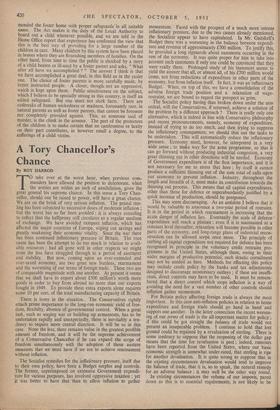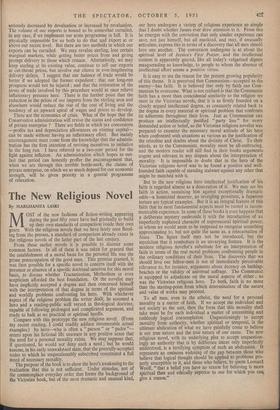A Tory Chancellor's Chance
By ROYHARROD
TO take over at the worst hour, when previous com- manders have allowed the position to deteriorate, when the armies are within an inch of annihilation, gives the great general his supreme chance. In this sense a Tory Chan- cellor, should one be raised to power, will have a great chance. We are on the brink of very serious inflation. The pound ster- ling has been subjected to successive doses of moderate inflation ; but the worst has so far been avoided ; it is always consoling to reflect that the halfpenny still circulates as a regular medium of exchange. We have avoided rampant inflation, which has affected the major countries of Europe, wiping out savings and greatly weakening their economic vitality. Since the war there has been continued inflationary pressure in Britain. The root cause has been the attempt to do too much in relation to avail- able resources ; had all gone well in other respects we might none the less have struggled through to a period of easement and stability. But now, coming upon an over-extended and over-taxed economy, are two great new burdens, rearmament and the worsening of our terms of foreign trade. These two are of comparable magnitude with one another. At present it seems that we shall have to export about £500 million's worth more goods in order to buy from abroad no more than our exports bought in 1949. To provide these extra exports alone requires some 10 per cent. of the total manufacturing capacity of Britain.
There is irony in the situation. The Conservatives rightly attach prime importance to the long-run economic yield of free- dom. flexibilty, absence of governmental control. When a great task, such as waging war or building up armaments, has to be undertaken rapidly and unexpectedly, there is inevitably a ten- dency to require more central direction. It will be so in this case. None the less, there remains value in the greatest possible amount of freedom, and it will be the supreme achievement of a Conservative Chancellor if he can expand the scope of freedom simultaneously with the adoption of those austere measures that we must have if we are to achieve rearmament without inflation.
The Socialist remedies for the inflationary pressure, itself due to their own policy, have been a Budget surplus and controls. The former, superimposed on extensive Government expendi- ture for various purposes, has involved oppressive taxation ; yet it was better to have that than to allow inflation to gather momentum. Faced with the prospect of a much more intense inflationary pressure, due to the two causes already mentioned, the Socialists appear to have capitulated. In Mr. Gaitskell's Budget there was a worsening in the balance between expendi- ture and revenue of approximately 000 million. To justify this, he provided a long rigmarole about easements occurring 'in the rest of the economy. It was quite proper for him to take into account such easements if only one could be convinced that they were •really there. Prolonged study of his statement seems to yield the answer that all, or almost all, of his 000 million would come, not from reductions of expenditure in other parts of the economy, but from inflation itself. In fact, it was an inflationary Budget. When, on top of this, we have a consolidation of the adverse foreign trade position and a relaxation of wage- restraint, we are bound to regard the prospect as'grim. The Socialist policy having thus broken down under the new ordeal, will the Conservatives, if returned, achieve a solution of the problem by a different approach ? There is really only one alternative, which is indeed in line with Conservative philosophy and recent pronouncements, namely, economy of expenditure. Instead of trying to do too much, and then trying to suppress the inflationary consequences, we should thin out the tasks to be undertaken. This will automatically reduce the inflationary pressure. Economy must, however, be interpreted in a very wide sense ; to make way for the arms programme, so that it can go forward without producing industrial congestion, a very great thinning out in other directions will be needed. Economy of Government expenditure is of the first importance, and it is not necessary for me to stress that here ; by itself it cannot produce a sufficient thinning out of the sum total of calls,upon our economy to prevent inflation. Industry, throughout the length and breadth of it, must make its contribution towards the thinning out process. This means that all capital expenditures, other than those for defence or superabundantly justified by a quick increase of production, should be postponed.
This may seem discouraging. As an antidote I believe that it would be valuable to announce a two-year period of restraint. It is in the period in which rearmament is increasing that the acute danger of inflation lies. Eventually the scale of defence expenditure will reach a plateau ; even if it is maintained at a constant level thereafter, relaxation will become possible in other parts of the economy, and long-range plans of industrial recon- struction can be allowed scope once more. The principle of curbing all capital expenditure not required for defence has been recognised in principle in the voluntary credit restraint pro- gramme in the United States, although there, owing to their wider, margins of productive potential, such drastic curtailment may not be needed as here. Methods for effecting this policy may include credit policy by the banks and tax adjustments designed to discourage unnecessary outlays ; if these are insuffi- cient, direct controls may have to be used. It must be remem- bered that a direct control which stops inflation is a way of avoiding the need for a vast number of other controls should inflation gather momentum.
For Britain policy affecting foreign trade is always the most important. In this case anti-inflation policies in relation to home expenditure and foreign trade should go hand in hand and support one another. In the latter connection the recent worsen- ing of our terms of trade is the all-important matter for policy ; if this could be got straight the balance of trade would not present an insuperable problem. I continue to hold that lost ground could be regained by a revaluation of sterling. There is some tendency to suppose that the reopening of the dollar gap means that the time for revaluation is past ; indeed, rumours have been reported from the United States, where our basic economic strength is somewhat under-rated, that sterling is ripe for another devaluation. It is quite wrong to suppose that in the existing circumstances devaluation would tend to improve the balance of trade, that it is, so to speak, the natural remedy for an adverse balance ; it may well be the other way round.
In existing circumstances the volume of our imports, pared down as this is to essential requirements, is not likely to be seriously decreased by devaluation or increased by revaluation. The volume of our exports is bound to be somewhat curtailed, in any case, if we implement our arms programme in full. It is physically impossible for us both to do that and export at or above our recent level. But there are two methods in which our exports can be curtailed. We may revalue sterling, lose certain marginal markets, while getting better prices from and giving prompt delivery to those which remain. Alternatively, we may keep sterling at its existing value, continue to sell our exports at cut-throat prices, but involve our clients in ever-lengthening delivery delays. I suggest that our balance of trade would be better if we adopted the former expedient ; that our long-run prospects would not be injured ; and that the restoration of the terms of trade involved by this procedure would at once relieve inflationary pressure here. There is the further point that the reduction in the prices of our imports from the sterling area and elsewhere would reduce the rise of the cost of living and the tendency of an upward spiral of wages and prices to develop.
These are the economics of crisis. What of the hope that the Conservative administration will revive the status and confidence of private enterprise ? There are fields in which tax concessions —profits tax and depreciation allowances on existing capital— can be made without having an inflationary effect. But mainly encouragement must come from the knowledge that the adminis- tration has the firm intention of reviving incentives to initiative in the long run. I have referred to a two-year period for the fight against inflation. An administration which hopes to out- last that period can honestly proffer the encouragement that, when we are through this terrible bottle-neck, the claims of private enterprise, on which we so much depend for our economic strength, will be given priority in a general programme of relaxation.






















































 Previous page
Previous page